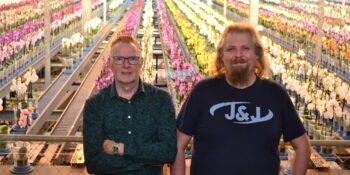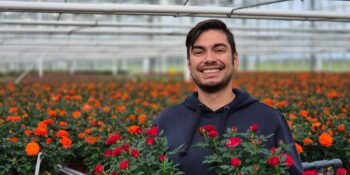On 4 December 2024 MPS hosted the event “The future of footprintcalculations in floriculture” at the World Horti Center in Naaldwijk. It was an inspiring afternoon focused on footprints and sustainability, featuring a diverse programme of speakers, panel discussions, and interaction between experts and participants.
Below you can find a summary of this successful event.
Daan de Vries (CEO, MPS)
Daan de Vries, CEO of MPS, kicked off the event with an introduction to the FloriPEFCR and the HortiFootprint Calculator. He explained how these tools assist growers in measuring their environmental impact, highlighting the importance of conducting a life cycle analysis for the sector’s sustainability.
Key aspects:
- The HortiFootprint Calculator is based on FloriPEFCR guidelines and measures the impact across 16 impact categories and 8 life stages.
- Key factors influencing environmental impact include energy usage and transport.
- The goal is not just to comply with regulations but to drive improvements.
Jeroen Oudheusden (CEO, FSI)
Jeroen, CEO of the Floriculture Sustainability Initiative (FSI), discussed FSI’s role in promoting sustainability. He stressed the need for collaboration within the sector and the importance of standardised tools for footprint calculations.
Key aspects:
- Collaboration and benchmarking are essential for a unified sustainability agenda.
- Reliable data is crucial to prevent the proliferation of tools.
- The next step is to use data for communication with consumers.
Cees van den Bos (Rabobank)
Cees, Climate Food & Agri Theme Manager at Rabobank, spoke about the importance of footprint calculations for banks and their Scope 3 emission targets. He explained how Rabobank supports businesses in their sustainability efforts with flexible loans and interest rate discounts.
Key aspects:
- Footprint data helps both companies and banks to achieve sustainability goals.
- Rabobank offers tools and benefits for sustainable businesses.
- Banks play a crucial role in the energy transition.
Karolien Tesselaar (Tesselaar Alstroemeria)
Karolien shared her experiences with footprint calculations and how her company reduced its CO₂ emissions by 22% over the last eight years. This was achieved through measures such as switching to green energy, using drygairs, and installing LED lighting.
Key aspects:
- Footprint data helps businesses make targeted sustainable choices.
- The greatest impact comes from energy usage, particularly through the switch to green energy and LED lighting.
- Footprint calculations are particularly useful for internal improvements, as well as external communication.
Jack Goossens (Gova B.V.)
Jack discussed the circular economy, how Gova B.V. integrates sustainability into its operations, and the reuse of residual streams. He provided examples of how pruning waste at Gova is repurposed, such as for laurel oil for black liquorice.
Key aspects:
- Circular thinking helps companies find new business models.
- Uniformity in footprint methods prevents unnecessary complexity.
- It is important to communicate carefully about footprint data to avoid misunderstandings.
Koen Druijf (FM Group)
Koen explained how FM Group uses footprint calculations to enhance their sustainability strategy, focusing on logistics and energy usage.
Key aspects:
- Company-wide footprint calculations help businesses prioritise sustainability efforts.
- Consistency in tools is vital to avoid misinterpretations.
- Footprint calculations enhance the credibility of both businesses and the sector.
Floor Schamp (VGB)
Floor discussed the need for collaboration within the value chain to drive sustainable innovations and the emergence of the CSRD and FloriPEFCR. She highlighted the importance of knowledge-sharing and partnerships.
Key aspects:
- Sustainability requires collaboration between growers, traders, and exporters.
- Knowledge-sharing accelerates innovations in the sector.
- Sustainability goals can only be achieved by partners who are committed to sustainability.
Olga Keijser (Coloríginz/DFG)
Olga spoke about the role of importers in the sustainability of the ornamental horticulture sector and how DFG integrates sustainability into their operations.
Key aspects:
- Exporters can promote sustainability by supporting transparent supply chains.
- Tools such as the HortiFootprint Calculator provide actionable insights.
- Measuring environmental impact helps build credible sustainability stories.
Concluding
The event concluded with a panel discussion where the speakers addressed questions from participants. A key takeaway was that collaboration within the value chain is essential for achieving sustainability. Growers, traders, and exporters must work together, invest, and be transparent about their performance and goals. Banks like Rabobank support sustainable initiatives with flexible financing.
Footprint calculations provide companies with valuable insights into their environmental impact and help them prioritise sustainability actions. Tools like the HortiFootprint Calculator allow for targeted improvements, especially in areas such as energy, transport, and packaging. Benchmarking helps companies compare their performance and continuously improve.
The importance of transparent communication was also emphasised. Sharing reliable sustainability information can contribute to a positive image of the sector and counteract negative perceptions. Credible stories supported by data are vital for convincing stakeholders of the efforts being made.
The circular economy offers numerous opportunities to reduce costs while becoming more sustainable, for example, by reusing residual streams. This contributes to both the sustainability and economic resilience of businesses.
Key insights:
- Collaboration in the value chain accelerates sustainable innovations.
- Footprint calculations help companies make targeted sustainability choices.
- Transparency and credible communication enhance the sector’s image.
- Circular processes offer opportunities for cost savings and material reuse.
- Footprint calculations are not a one-off exercise but an ongoing process.
- Footprint calculations are crucial for all stages of the value chain, from growers to traders and consumers.
On behalf of MPS, we would like to thank the nearly 200 participants for attending and the speakers for their inspiring contributions. We look forward to welcoming you (again) at our next event!



